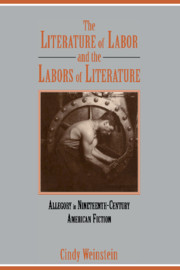 The Literature of Labor and the Labors of Literature
The Literature of Labor and the Labors of Literature Published online by Cambridge University Press: 06 July 2010
In late January 1851, Herman Melville toured a paper mill in Dalton, Massachusetts, and four years later fictionalized the visit in “The Paradise of Bachelors and the Tartarus of Maids.” The narrator takes a tour of the mill in which he witnesses a frightening scene of production. He describes “a tall girl, feeding the iron animal [the paper machine] with half quires of rose-hued note paper” which “received in the corner the impress of a wreath of roses.” The traditional rosy-cheeked young girl is replaced by “pale, blue girl[s]” (327) with “pallid cheek[s]” (328) and “face[s] pale with work” (327). Work, as the debate about the Lowell mill operatives indicated, did not necessarily guarantee spiritual or economic enhancement but increasingly seemed to undermine individual agency and bodily integrity. Instead of developing character in a version of the Romantic symbol, work appeared to flatten it out in an image of Coleridgean allegory. In the tartarus of maids we witness the production of allegorical characters as the paper machine drains the rosiness of the girls' cheeks until the product takes on the quality of natural rosiness, leaving “rows of blank-looking girls, with blank, white folders in their blank hands, all blankly folding blank paper” (328). The machine has replaced Aylmer, the operatives' cheeks have replaced Georgiana's, but rosy cheeks continue to pose a problem; that is, the complex relations among work, writing, and the body remain and continue to be played out upon the bodies of allegorical characters.
To save this book to your Kindle, first ensure [email protected] is added to your Approved Personal Document E-mail List under your Personal Document Settings on the Manage Your Content and Devices page of your Amazon account. Then enter the ‘name’ part of your Kindle email address below. Find out more about saving to your Kindle.
Note you can select to save to either the @free.kindle.com or @kindle.com variations. ‘@free.kindle.com’ emails are free but can only be saved to your device when it is connected to wi-fi. ‘@kindle.com’ emails can be delivered even when you are not connected to wi-fi, but note that service fees apply.
Find out more about the Kindle Personal Document Service.
To save content items to your account, please confirm that you agree to abide by our usage policies. If this is the first time you use this feature, you will be asked to authorise Cambridge Core to connect with your account. Find out more about saving content to Dropbox.
To save content items to your account, please confirm that you agree to abide by our usage policies. If this is the first time you use this feature, you will be asked to authorise Cambridge Core to connect with your account. Find out more about saving content to Google Drive.